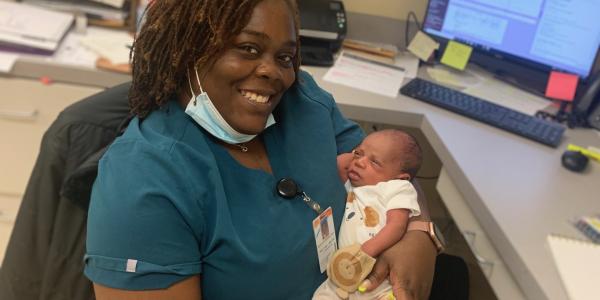A degree in African and African American studies laid the groundwork for Dr. Heather Skanes, AB ’10, to launch Alabama’s first birthing center.

When Dr. Heather Skanes, AB ’10, meets with pregnant patients at the prenatal care and childbirth facility she established in 2022, she often draws upon her bachelor’s degree in African and African American studies.
“A linguistics course taught me that African American vernacular has its own rules and consistency,” she said. “When people come to the center, we speak to them in a way that makes them feel comfortable.”
After completing her education, Skanes returned home to Alabama in 2019 to address the challenges of Black maternal health and the high mortality rates affecting Black mothers. Black women in Alabama are three times more likely to die from pregnancy-related causes than white women, according to the Centers for Disease Control and Prevention, and the state’s overall maternal mortality rate is nearly twice the national rate.
While working as an OB-GYN, Skanes interacted with midwives and saw their potential to tackle the complexities of Black maternal health. Midwives can provide specialized care before, during, and after childbirth. They are often more supportive of natural approaches to pregnancy and birth, Skanes said, working with patients to create personalized plans that respect their choices and goals.
The profession was once a vital part of Alabama’s healthcare ecosystem. “If you go back to the early 1900s, there were hundreds of midwives in Alabama and the majority of them were Black,” Skanes said, adding that Black women were not allowed to give birth in most hospitals at the time. By the 1970s, midwifery began to fall out of favor, and the practice was officially banned from the state in 1976.
Around the time Skanes was finishing her medical residency at Morehouse College, advocates were pushing to reestablish midwifery, and in 2017 Alabama re-legalized the profession. Further grassroots efforts led to the legalization of nonhospital birth centers in 2022.
While hospitals are vital for high-risk pregnancies and complicated births, Skanes said many pregnancies are low risk and perfect for a birth center setting. “Alabama is a healthcare desert, and the large hospitals here have to treat everyone the same way,” she said. “For low-risk births, midwifery care in a birth center means you get more education, more time, and more comfort with your provider, which can go a long way in improving disparate health outcomes.”

The team has consulted with over 100 families. (Photos courtesy of Heather Skanes)
Skanes’s clinic, Oasis Family Birthing Center, is located in an underserved area of Birmingham, Alabama, and is the state’s first certified birthing center. Patient care is at the heart of the clinic, and Skanes’s liberal arts education helped inform her decisions about how to make the space as welcoming as possible for a range of patients. “On the walls, there’s art and imagery of Blackness,” she said. “The center has the comforts of a home. I want people to know we will treat them as we would treat our own families.”
Wilmetta Toliver-Diallo, senior assistant dean of advising in the College of Arts & Sciences and a lecturer in African and African American studies, worked with Skanes when she was a WashU undergraduate involved in Black Anthology, a student-run theater production. Toliver-Diallo often invites Skanes to speak to first-year students in “Foundations in African & African-American Studies” and helped bring her to campus last year for a talk on the challenges Black women face as patients of OB-GYNs.
“You can’t heal someone’s body without considering the holistic process and understanding the sociological determinants that affect patients.”
— Wilmetta Toliver-Diallo, lecturer in African and African American studies
Toliver-Diallo isn’t surprised to find that Skanes’s career has made an impact — and that her work connects back to her studies at WashU. “She has always been drawn to the humanities side of arts and sciences,” Toliver-Diallo said. “You can’t heal someone’s body without considering the holistic process and understanding the sociological determinants that affect patients.”
Three years after opening, Oasis Family Birthing Center has consulted with more than 100 families and helped deliver more than 30 babies. Skanes hopes her work will continue to highlight the positive health outcomes associated with midwives. “We are educating Black midwives as a way to create equitable access and decrease overall mortality rates and disparities,” she said. “We hope to show people that this is a good thing for Alabama.”
This story appeared in the Spring 2025 issue of Ampersand magazine. See more stories from the magazine and browse our archives.





